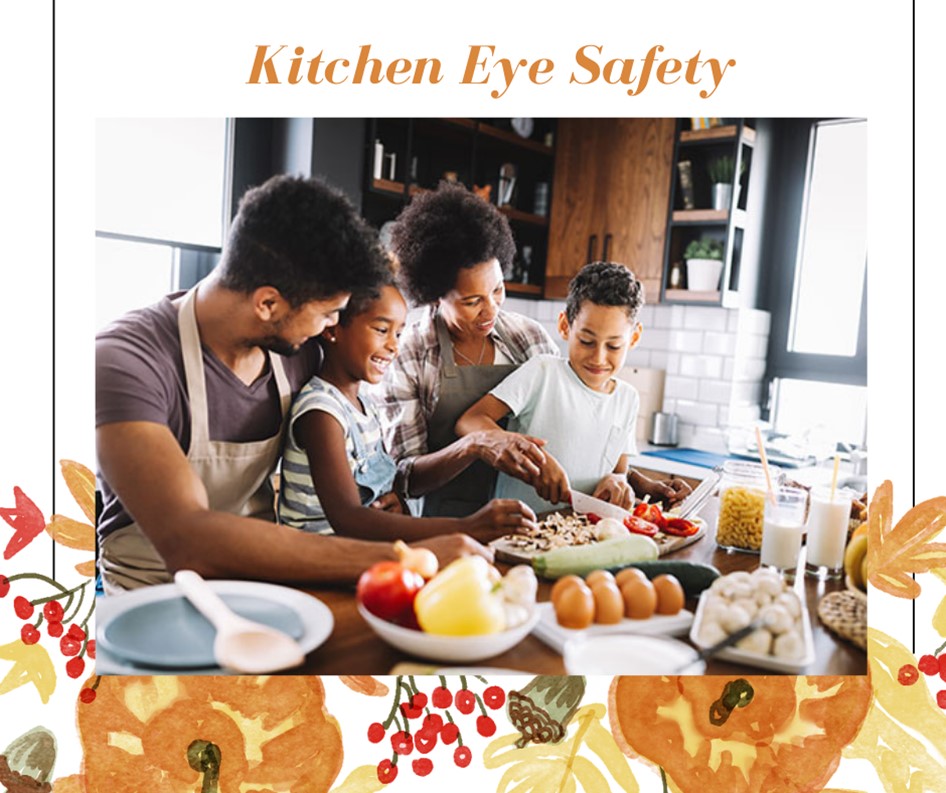Home » News and Events » Kitchen Eye Safety
Kitchen Eye Safety
Posted by: Florida Eye Microsurgical Institute in Worth Sharing...

The Thanksgiving holiday is almost here for us to celebrate with cheer! Although we may be celebrating the holiday differently this year, the favorite Thanksgiving dinner traditions will still live on for a happy holiday season. As we prepare our Thanksgiving nutritious meals, let’s take a look at a few eye safety tips from the American Academy of Ophthalmology to avoid common eye hazards to stay safe in the kitchen. Keep in mind, prevention is the best strategy.
Hot Grease Can Splatter and Burn Your Eye
Hot cooking oil and grease can easily splash onto the eye and burn your cornea. This common injury can be avoided by wearing glasses or, at the very least, using a grease shield or lid on the pan.
If hot grease splashes in your eye, immediately flush it with plenty of water. The water will remove the grease and any particles. Do not use anti-redness drops to rinse your eye.
Artificial tears may soothe your eyes after a small grease splash but see your eye doctor as soon as possible if there is apparent injury, excessive pain, or you are worried about your eye. You may be more susceptible to eye infections or other eye injuries while your eye is healing.
Watch Out for Bubbling Sauces and Splashing Liquids
Any liquid that splashes in your eye can be uncomfortable. But food liquids may be especially dangerous. Fluids from food are often acidic and can cause your eyes to tear up and sting. Some foods, like raw chicken liquid, contain bacteria that could cause an eye infection. Simmering sauces can splash out of the pot and burn or blister your eye.
If this happens, flush your eye with plenty of water and see an eye doctor right away.
Spicy Residues Can Stick to Your Fingers and End Up in Your Eye
When you chop jalapeño peppers and use other spicy ingredients, your fingers retain oily residues that can end up in your eyes. Wash your hands thoroughly after preparing food. Or better yet, wear gloves while chopping vegetables and working with spices.
If pepper or spice oils end up in your eye, flush with plenty of water and then wash your eyelids and the area around your eye with baby shampoo. Never put any soap directly in your eye.
Cleaning Chemicals Can Cause Blinding Eye Injuries
Cleaning products are among the top eye hazards in the kitchen. You should always wear eye protection when working with cleaning chemicals. Bleach, oven cleaners, and other cleaning chemicals can cause serious, blinding eye injuries. If you get any cleaning products in your eyes, immediately flush with plenty of water and seek medical attention. The longer the exposure, the worse the damage can be.
Stay Safe While Using Knives, Scissors, and Other Sharps
Sharp objects are the third-most-common cause of eye injuries in kids. Sharp objects are the third-most-common cause of eye injuries in a kid. Be especially careful with knives, forks, scissors, and sharp objects when teaching young children to cook.
Don’t Slip! Keep Floors Clean and Cabinet Doors Closed
Loose rugs, open cabinets, and liquid spills on the floor could be more of a hazard to your eyes than you realize. Falls are a top cause of eye injury in the United States. People 60 years old and older are especially prone to eye injuries from falls. Before you start cooking, make sure your kitchen is as safe for grandma as it is for the grandkids.
Contact Us With Eye Safety Questions
If you do injure yourself, tell your eye doctor right away. Head straight to the emergency room if you experience prolonged pain, redness, blurred vision, tearing, or a sensation that something is in your eye. If you are looking for additional advice on kitchen eye safety or would like to run your eye injury emergency plan by us, we will be happy to help!
Your Eye Safety Is Our First Priority!
Source: The American Academy of Ophthalmology
